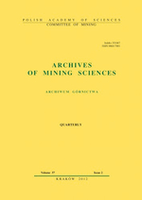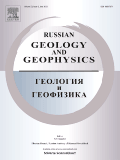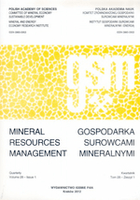
Riset Geologi dan Pertambangan
Scope & Guideline
Fostering collaboration for a sustainable geological landscape.
Introduction
Aims and Scopes
- Geological Studies:
Research related to geological formations, processes, and features, including petrology, geochemistry, and structural geology. - Mining Engineering and Resource Management:
Studies that explore mining techniques, resource extraction methods, and the management of mining operations, emphasizing sustainability and efficiency. - Environmental Geology and Hydrogeology:
Investigations into the interactions between geological processes and environmental factors, including water resource management, contamination, and hazard assessment. - Geophysical and Geotechnical Analysis:
Application of geophysical methods for subsurface exploration and geotechnical evaluations to assess soil and rock properties, aiding in construction and resource extraction. - Disaster Risk Assessment:
Research focusing on natural hazards such as landslides, earthquakes, and tsunamis, including risk evaluation and mitigation strategies. - Geological Mapping and Modeling:
Utilization of various modeling techniques and geological mapping to better understand subsurface structures and their implications for resource exploration.
Trending and Emerging
- Water Resource Management:
There is a noticeable increase in studies focusing on water resource assessment and management, particularly in relation to watershed analysis and water criticality indexes, highlighting the growing importance of sustainable water practices. - Geotechnical and Hydrogeological Investigations:
Research emphasizing geotechnical assessments and hydrogeological characteristics is becoming more prevalent, indicating a trend towards understanding subsurface conditions for better resource management and environmental protection. - Environmental Impact and Risk Assessment:
The focus on assessing natural disaster risks, such as landslides and tsunamis, is trending upward, reflecting an increased awareness of environmental hazards and the need for effective mitigation strategies. - Innovative Modeling Techniques:
Emerging methodologies, such as two-dimensional resistivity modeling and magnetotelluric data analysis, are gaining popularity, showcasing advancements in geophysical techniques for subsurface exploration. - Sustainable Mining Practices:
Research into sustainable mining practices, including the reuse of mining waste and innovative resource extraction methods, is increasingly relevant, aligning with global sustainability goals.
Declining or Waning
- Biostratigraphy and Paleontology:
Research on biostratigraphy, particularly related to molluscan studies, has become less frequent, potentially indicating a shift towards more applied geological studies with immediate relevance to resource management. - Geothermal Studies:
While geothermal energy remains an important topic, there appears to be a reduction in publications focusing specifically on geothermal reservoir identification, suggesting a possible waning interest or saturation in this area. - Ichnofossils and Paleochannels:
The identification and characterization of ichnofossils and paleochannels have seen less emphasis, possibly indicating a transition towards more practical applications of geological research.
Similar Journals

Archives of Mining Sciences
Bridging theory and practice in mining sciences.Archives of Mining Sciences is a peer-reviewed journal published by the Polska Akademia Nauk (Polish Academy of Sciences), dedicated to advancing knowledge in the fields of geochemistry, petrology, geotechnical engineering, and engineering geology. With an ISSN of 0860-7001 and an E-ISSN of 1689-0469, this journal has been a vital resource for professionals and researchers since its inception in 1991. Housed in Poland, the journal serves as a platform for the dissemination of significant research results, technical developments, and case studies, ensuring accessibility to a global audience. Competing in a rigorous landscape, it has achieved a notable Q3 ranking in 2023 within both the Geochemistry and Petrology and Geotechnical Engineering and Engineering Geology categories. As it converges through its years of publication—currently covering the period from 2008 to 2024—the journal maintains a strong focus on fostering innovative research that addresses crucial geological challenges. Its presence in Scopus rankings reinforces its commitment to quality and relevance, making it an essential read for students and professionals seeking to stay at the forefront of mining sciences.

Acta Montanistica Slovaca
Pioneering Research in Geochemistry and GeologyActa Montanistica Slovaca, published by the BERG Faculty of Technical University Košice in Slovakia, stands as a significant open-access platform since 2004 for disseminating high-quality research in the fields of geochemistry, petrology, geology, and geotechnical engineering. With a rising impact highlighted by its current standings in the 2023 Category Quartiles—ranking Q3 in Geochemistry and Petrology, and Q2 in both Geology and Geotechnical Engineering—it serves as a vital resource for scholars and practitioners alike. The journal's Scopus rankings further underscore its influence, placing it in the 69th percentile for Earth and Planetary Sciences in Geology and demonstrating its commitment to advancing knowledge in dynamically evolving fields. The journal not only embraces a wide international readership but also encourages the open exchange of innovative ideas, making it a crucial tool for research, education, and collaboration.

GEOLOGICAL QUARTERLY
Connecting Minds in Earth Sciences Since 2000.GEOLOGICAL QUARTERLY, published by the Polish Geological Institute, is a respected journal in the field of geology, offering insights into Earth and planetary sciences since its inception in 2000. With an ISSN of 1641-7291 and an E-ISSN of 2082-5099, this journal serves as a vital platform for researchers, professionals, and students seeking to expand their knowledge in geological disciplines. The journal is positioned in Q3 within the geology category as of 2023 and ranks #172 out of 321 in Scopus, placing it in the 46th percentile among its peers. Although currently not an open-access publication, GEOLOGICAL QUARTERLY reflects the policy of fostering scientific communication and collaboration by disseminating valuable geological research. Its commitment to publishing original articles, reviews, and technical notes ensures that it plays a significant role in advancing geological science and its applications within the academic community. With its base in Warsaw, Poland, the journal stands as an important resource for anyone engaged in or studying the Earth sciences.

Russian Geology and Geophysics
Navigating the Complexities of Earth's SystemsRussian Geology and Geophysics is a seminal journal published by GEOSCIENCEWORLD that plays a pivotal role in the dissemination of vital research within the realms of Earth-Surface Processes, Geology, and Geophysics. With an ISSN of 1068-7971 and an E-ISSN of 1878-030X, this journal has witnessed a continuous evolution since its convergence in 2007 and is poised to thrive through 2024. While it is not an Open Access journal, it is recognized for its significant contributions to the academic community, holding a respectable Q2 ranking in Earth-Surface Processes and Q3 rankings in both Geology and Geophysics as of 2023. The journal’s impact factors align it within competitive quartiles, marking it as an essential resource for researchers and professionals seeking to stay at the forefront of geological and geophysical sciences. By publishing high-quality peer-reviewed articles, the journal fosters an environment of knowledge sharing and innovation, making it indispensable for students, practitioners, and scholars alike who are dedicated to advancing our understanding of Earth's complex systems.

Applied Earth Science-Transactions of the Institutions of Mining and Metallurgy
Unlocking Insights for the Mining and Metallurgy SectorsApplied Earth Science - Transactions of the Institutions of Mining and Metallurgy, published by SAGE Publications Inc, is a vital academic journal located in the United Kingdom that seeks to illuminate the intricate relationship between earth sciences and the mining and metallurgy industries. With an ISSN of 2572-6838 and an E-ISSN of 2572-6846, the journal features peer-reviewed research encompassing various subfields such as Geochemistry, Petrology, and Geotechnical Engineering. As an open-access journal, it ensures that cutting-edge findings are readily available, promoting broad access to knowledge crucial for professionals, researchers, and students alike. With its convergence of research years from 2018 to 2024, the journal maintains a Q3 ranking in Earth and Planetary Sciences and Q4 rankings in Geochemistry and Petrology as well as Geotechnical Engineering, which demonstrates its emerging influence in these disciplines. The journal not only provides a platform for innovative research but also addresses practical challenges faced within the field, making it essential reading for those engaged in the applied earth sciences.

BOLETIN GEOLOGICO Y MINERO
Connecting Researchers with the Heart of GeologyBOLETIN GEOLOGICO Y MINERO is a significant academic journal published by the Instituto Geológico Minero de España, focusing on the fields of Geology and Geochemistry. Established in 1980, this journal provides a platform for researchers to disseminate vital studies and findings in the earth sciences, encompassing an array of topics from mineralogy to environmental geology. Despite its Q4 ranking in both Geochemistry and Petrology and Geology categories as of 2023, the journal serves as a resource for emerging research and innovative methodologies in these critical fields, promoting a deeper understanding of geological processes and materials. While currently operating without an open-access model, the journal is committed to advancing knowledge through rigorous peer-review standards. With its roots in Spain, the BOLETIN GEOLOGICO Y MINERO significantly contributes to the European geological research community and remains an invaluable resource for students, professionals, and researchers alike engaged in the pursuit of geological science.

Gospodarka Surowcami Mineralnymi-Mineral Resources Management
Driving Innovation in Mineral EconomicsGospodarka Surowcami Mineralnymi-Mineral Resources Management is a pivotal academic journal published by the Polish Academy of Sciences and the Mineral and Energy Economics Research Institute. Focusing on the field of Economic Geology, this journal plays a critical role in disseminating research on mineral resources management, exploring the economic implications of mineral exploitation, sustainability practices, and technological advancements in resource extraction. With an ISSN of 0860-0953 and an E-ISSN of 2299-2324, the journal has established itself as a respected source of knowledge, holding a Q3 ranking in its category as of 2023 and demonstrating its relevance within a competitive landscape where it ranks 22nd out of 43 in Economic Geology according to Scopus. Researchers, professionals, and students will find this journal to be an invaluable resource for the latest insights and developments in mineral resource management, contributing significantly to the overarching conversations in geology and environmental science.

JOURNAL OF THE GEOLOGICAL SOCIETY OF INDIA
Bridging theory and practice in the realm of geology.JOURNAL OF THE GEOLOGICAL SOCIETY OF INDIA, published by Springer India, serves as a pivotal platform for researchers and practitioners in the field of geology. Established in 1979, this journal has been instrumental in advancing geological research throughout India, showcasing both regional studies and cutting-edge global research. With its Category Quartile ranking of Q3 in the geology category for 2023, and a significant Scopus rank of 171 among 321 journals in Earth and Planetary Sciences, it remains a respected source of scholarly activity. The journal is dedicated to the dissemination of original research articles, reviews, and case studies that encapsulate the dynamic scope of geological science, thus contributing to the understanding of geological phenomena. Although currently not offering open access, the journal maintains a commitment to high-quality scholarship and aims to engage a diverse readership, enhancing the knowledge and practice of geology across various disciplines.

Geam-Geoingegneria Ambientale e Mineraria-Geam-Geoengineering Environment and Mining
Pioneering research at the intersection of earth science and sustainability.Geam-Geoingegneria Ambientale e Mineraria (Geam-Geoengineering Environment and Mining), published by PATRON EDITORE S R L in Italy, is a pivotal journal dedicated to the intersection of environmental engineering, geotechnical engineering, and engineering geology. With an ISSN of 1121-9041, this journal has been a key source of valuable research since 2007, fostering the dissemination of knowledge within these critical fields. Despite its current ranking in the Q4 category for both Environmental Engineering and Geotechnical Engineering in 2023, the journal aims to elevate its standing by promoting high-quality submissions that address pressing issues related to sustainable geoengineering practices and environmental impacts of mining activities. Although not an open-access journal, Geam-Geoingegneria Ambientale e Mineraria offers insights that are crucial for professionals, researchers, and students looking to contribute to the advancement of geoengineering approaches and their implications for both the environment and mining industries. As it continues to bridge theoretical frameworks with practical applications, the journal stands as an important avenue for scholarly discourse and innovation in these domains.

Boletin de Ciencias de la Tierra
Connecting Scholars to the Heart of Earth SciencesBoletin de Ciencias de la Tierra is a distinguished open-access journal dedicated to the field of Earth and Planetary Sciences, published by the Universidad Nacional de Colombia, Sede Medellín. Since its transition to open access in 2006, it has become an essential platform for disseminating high-quality research that addresses critical geological and environmental issues pertinent to Latin America and beyond. With an ISSN of 0120-3630 and an E-ISSN of 2357-3740, the journal aims to promote scientific dialogue and share innovative findings in various areas including geology, geochemistry, and environmental sciences. Although it currently holds a Scopus rank of #184 in the General Earth and Planetary Sciences category, indicating a percentile of only 5, Boletin de Ciencias de la Tierra is committed to fostering a rich academic discourse and enhancing the visibility of scholarly works. Situated in Medellín, Colombia, the journal serves as a vital resource for researchers, professionals, and students looking to explore advancements and participate in the global conversation on Earth sciences.